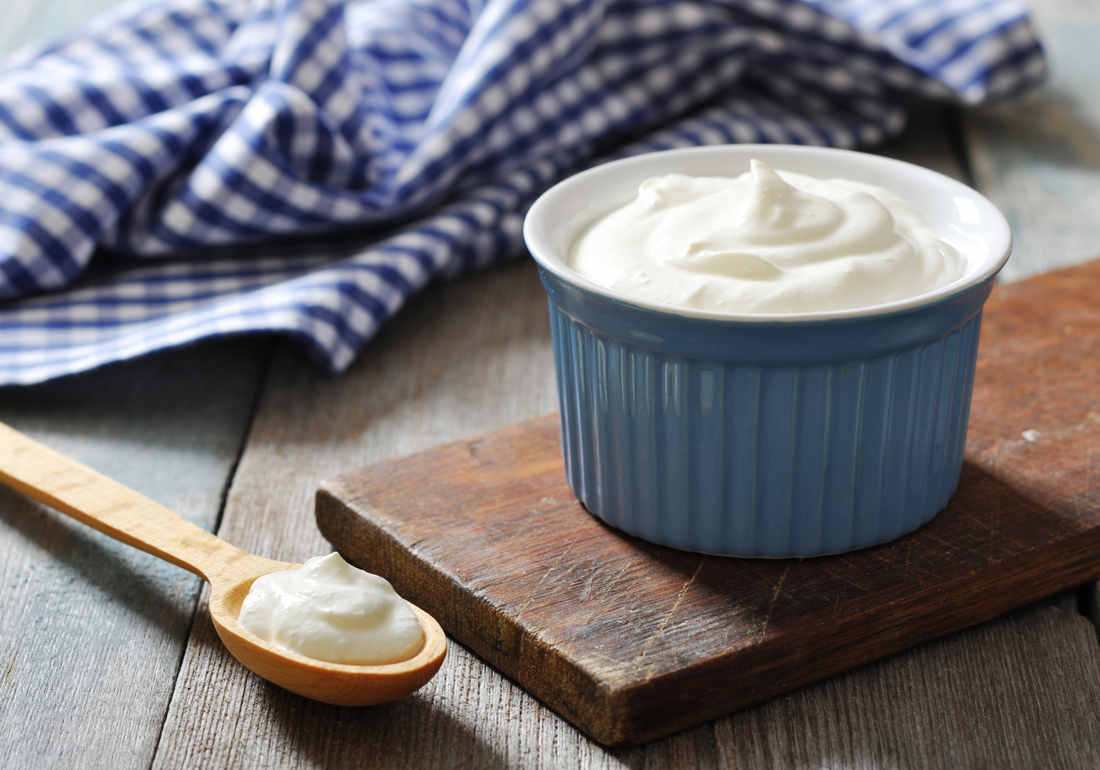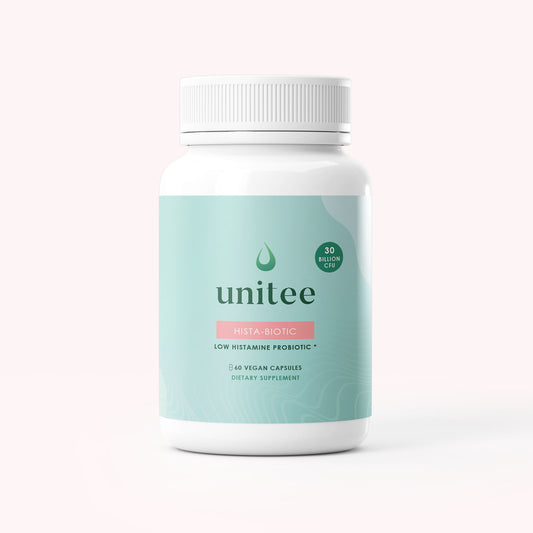If you've been trying to find the best probiotics for histamine intolerance - your search is over.
Probiotics are one of the most essential supplements for healing histamine intolerance. But many people don't know that most probiotics actually produce histamine.
Wait, what? That's right. Even those healthy strains of bacteria you've been taking daily may be making your symptoms worse.
To get a healthy gut and promote DAO enzyme production (the enzyme that helps break down histamine) it’s so important to ensure you are taking low histamine probiotics. And, today, I'll explain exactly which strains (and even brands) are the best probiotics for histamine intolerance.
Let's get started.
The Importance of Probiotics for Histamine Intolerance
Our body houses over 100 trillion bacteria which are, in some way, involved in every single bodily function, ranging from immune health to daily mood and energy.
Disorders such as histamine intolerance are no exception when considering the role of gut bacteria in your symptoms.
In fact, in my previous post about what causes histamine intolerance, I explain how gut bacteria can not only be a contributor to your histamine symptoms but can actually be the main underlying cause of histamine intolerance itself.
With the multitude of systems impacted by histamine intolerance and the multi-symptomatic nature of this disorder, there will always be some level of bacterial involvement.
This is exactly why finding the best probiotic for histamine intolerance is always going to be important.
Accidentally getting high histamine probiotics is of course a simple mistake to make. We're told probiotics are good for our gut and overall health, so many people turn to popular brands when feeling poorly, not recognizing that most common strains will naturally produce histamine.
In fact, finding low histamine probiotic supplements is darn near difficult - it's like finding a salad at a restaurant without high histamine veggies. It works for most people, but not for those with histamine intolerance!
So, I'll dive into this topic and outline how to make your decision on probiotics for histamine intolerance.
How Gut Bacteria Influence Histamine Intolerance
Bacteria are involved both in the production and degradation of histamine.
When we consume foods containing the semi-essential amino acid, histidine, certain types of bacteria within the gut can convert this amino acid into histamine.
This conversion increases internal histamine levels - even if the food itself was not considered a histamine-rich food.
In most cases, the conversion of histidine to histamine is non-problematic and even beneficial.
But for those who experience histamine intolerance, there can be a buildup of excess histamine in their body; and an imbalance of the gut bacteria may be responsible for degrading histamine.
If the population of these histamine-degrading bacteria falls too low, this also contributes to a chronic increase of internal histamine levels.
As you can see, there are several bacterial paths promoting histamine intolerance.
But why the heck is your gut bacteria so out of whack to begin with?
There are several reasons these bacterial populations can go haywire, including illness, pathogenic invasion, dietary factors, antibiotic use, chronic stress and other environmental and lifestyle influences.
In fact, bacterial production of histamine is the very same reason why histamine intolerant individuals should avoid fermented foods (bone broth, kefir, wine, cheese).
While bacteria are busy digesting and fermenting to produce your wines and cheeses, they also turn these into high histamine foods!
In nearly all cases, eating a low histamine diet and finding the right probiotics for histamine intolerance are essential.
Restoring Gut Bacterial Balance
In an attempt to restore gut bacterial balance, also known as dysbiosis, many people naturally turn to probiotics for histamine intolerance.
Numerous studies have shown that probiotics may improve gut bacterial populations and improve overall health. So this is generally a great solution.
But histamine intolerance poses an additional conundrum.
Grabbing any random bottle of probiotics off the shelf is one of the biggest mistakes you can make if you’re histamine intolerant. Even if you've heard it's the best probiotic on the market.
Almost all probiotics will contain strains of bacteria that produce histamine and, therefore, they possess the ability to throw off your bacterial balance and worsen symptoms.
It's important to note that these histamine-producing bacteria are really not an issue for those who are not histamine intolerant, which is why other people with a different disorder may have had success using them and may be recommending them.
As the example I gave above, it can be thought of as a salad - many people would feel great having a salad filled with spinach, tomatoes, nuts and a lemon vinegar dressing. However, for those with histamine intolerance, this salad would wreak havoc on your body.
My goal here is not to demonize probiotics - they're such an amazing tool for improving gut health.
Instead, my goal is to educate you on how to personalize your probiotic choice to suit your histamine intolerance and avoid buying products that may cause symptoms.
Low Histamine Probiotics List
I’ve done a lot of research to find you the absolute best probiotics for histamine intolerance. The list below details exactly which have shown to be beneficial probiotics for histamine intolerance, which ones should be avoided, and which are still in question (or may only benefit certain symptoms).
Low Histamine Probiotics and Strains to Look For
When it comes to reducing symptoms, these are the probiotics I recommend to my clients with histamine intolerance.
- Bifidobacterium infantis
- Lactobacillus gasseri
- Bifidobacterium breve
- Bifidobacterium bifidum
- Lactobacillus salivarius
- Lactobacillus rhamnosus (especially GG) – May help stabilize mast cells and reduce the sensitivity of histamine and allergy-associated receptors
- while up-regulating anti-inflammatory cells.
- Bifidobacterium longum – Known to be a histamine degrading probiotic . It may help reduce the post-meal inflammatory response and prevent or improve intestinal hyperpermeability (“leaky gut syndrome”).
- Bifidobacterium lactis – May help break down histamine and tyramine.
- Lactobacillus plantarum – May help your body break down biogenic amines , including histamine and tyramine.
Probiotic Strains to Avoid
These species may increase your body’s natural histamine production or contain histamine themselves.
- Lactobacillus casei
- Lactobacillus Bulgaricus
- Streptococcus thermophilus
- Lactobacillus delbrueckii
- Lactobacillus helveticus
Additional Probiotic Strains of Importance
I’ve found these strains that are either still being evaluated or have been effective in treating specific symptoms.
- Lactobacillus reuteri – Although many low histamine foods lists put this bacterial strain in a histamine producing category, Lactobacillus reuteri is an interesting case. In addition to raising histamine, it also is helpful in increasing levels of anti-inflammatory cyclic adenosine monophosphate (cAMP).
- Saccharomyces-Boulardii – This is a low histamine probiotic that also helps regulate digestive issues, like diarrhea.
- Lactobacillus lactis – This strain is still being debated by scientists and medical professionals.
- Lactococcus Lactis – This is a strain used to make some high-histamine foods but some studies found it to be histamine-neutral.
- Lactobacillus acidophilus – This strain has been heavily studied by medical professionals and lower doses (below 1 billion CFU) appear to be histamine neutral while reducing inflammation and improving gut health.
The Best Probiotics for Histamine Intolerance
Although it's easy to put together a list of low histamine bacteria, finding an actual brand that carries a probiotic for histamine intolerance in stores can be very difficult.
High histamine species from the 'avoid' or 'questionable' lists, such as Lactobacillus acidophilus (in doses above 1B CFU) or Streptococcus thermophilus, tend to be some of the most commonly carried strains by stores and pharmacies.
In my extensive work of using probiotics for histamine intolerance sufferers, I’ve found this to be the best low histamine probiotic, as it contains only strains that have shown to be histamine-friendly. Most of my clients are able to incorporate this probiotic without issue and experience beneficial results for gut health and overall symptoms.
This probiotic, paired with a low histamine diet, promotes a healthy gut bacteria balance AND helps reduce histamine intolerance symptoms.
Now that you know exactly where to start, you can begin improving your gut bacterial balance with confidence!
FAQ: Probiotics for Histamine Intolerance
Should everyone with histamine intolerance be taking probiotics?
This is a personal decision. More research is showing that health begins in the gut, so I do believe low histamine probiotics are one of the most important supplements for histamine intolerance, however therapy plans can always be done without supplements and the progress simply tends to be slower. It all depends on if you want to speed up your results or if you prefer to avoid supplements all together.
Can I take probiotics in the form of yogurt?
Absolutely! The same principle applies, however, that the bacteria in that yogurt must be all low histamine strains. Commercial yogurts all tend to contain high histamine strains so making yogurt at home using low histamine probiotics from the strains listed above can be a great option.
Why do some probiotics with similar / same names make me feel worse than others?
There are variations at the species vs strain levels of probiotics. The sub-types we use in our low histamine probiotic formulation have been specifically studied to reduce histamine, and we third party test our products to ensure they contain exact match strains. Other probiotics may have the same species name but not be an exact match strain to that which is histamine neutral or antihistamine.
If you have any further questions, please always feel free to get in touch. We are happy to educate!
Put your health in nature's hands.
Anita Tee, Nutritional Scientist

Anita Tee
My name is Anita Tee. I'm a nutritional scientist who specializes in histamine intolerance. I hold a Master of Science in Personalized Nutrition and a Bachelor of Science in Human Biology and Psychology.For the past ten years, I have used my experience in nutritional and medical health sciences to create a scientifically backed, natural approach to healthcare that relies 100% on evidence-based research.As I previously suffered from - and overcame - histamine intolerance, my focus is to increase recognition and expand the available resources and protocols available for resolving this particular disorder. To date, I have helped over 4,000 individuals fully resolve or better manage their histamine intolerance symptoms.







